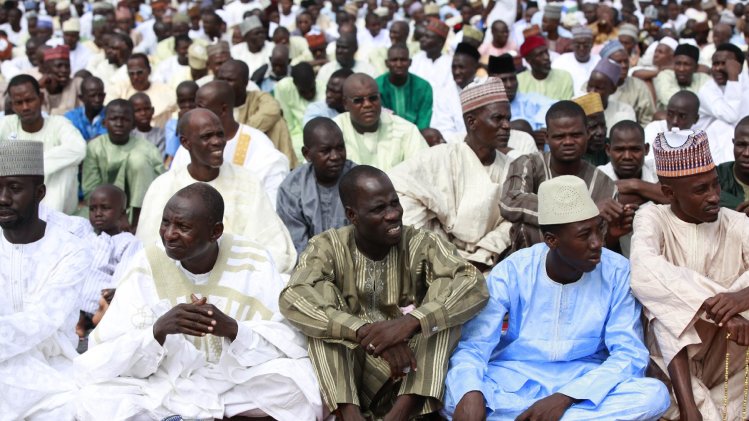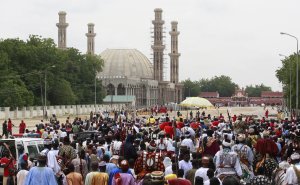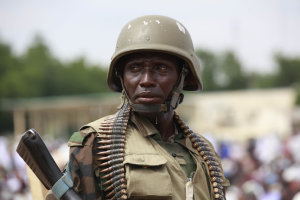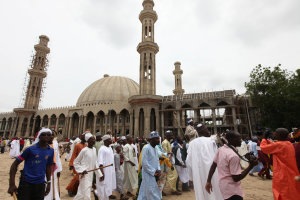நைஜீரிய போகோ ஹராம் முஸ்லீம்கள் வேறொரு பிரிவு முஸ்லீம் மசூதியில் தாக்குதல் நடத்தியதில் 47 பேர் அல்லாஹூ அக்பர்
Official says 47 killed in Nigerian mosque attack

KONDUGA, Nigeria (AP) — Residents of a village in northeastern Nigeria where suspected Islamic extremists gunned down 47 worshippers praying in a mosque demanded on Tuesday that the government give them weapons to defend themselves.
Earlier reports about Sunday's attack in Konduga village had given a lower death toll, 44. Another 12 civilians died in a simultaneous attack on a nearby village, security agents said.
The violence has been blamed on the Boko Haram terrorist network, and district head Yale Zannah Masu told The Associated Press that his village of Konduga was besieged for hours by "terrorists" — including women who set ablaze 51 homes.
Terrorist attacks by women would be unusual in Nigeria, but its military has reported arresting suspected women members of the banned Boko Haram as well as male suspects disguised in women's robes and veils.
Zannah Masu spoke during a visit to Konduga by governor of Borno state, Kashim Shetimma, who drove under military escort the 35 kilometers (22 miles) from his base in the state capital, Maiduguri, to the nearly deserted village.
He was met by a few enraged people who complained bitterly that the government had sent too few troops to protect them.
"We suffered this pain and loss because there is limited number of soldiers here," Zannah Masu told Shetimma.
Others said the government needs to give them guns for self-defense.
The governor offered free medical treatment for the 39 wounded people described by Zannah Masu and 250,000 naira ($1,560) for each bereaved family.
Sunday's violence was the latest in a slew of attacks blamed on religious extremists wanting to oust the government and install strict Islamic law throughout the nation of more than 160 million people. The country is about equally divided between a predominantly Muslim north and mainly Christian south.
On Tuesday, Britain's Foreign Office minister for Africa, Mark Simmonds, strongly condemned the Konduga attack.
"Attacking innocent people in a place of worship is a contemptible and cowardly act," he said in a statement. He said Britain "stands with the government and people of Nigeria as they seek to reduce violence in the northeast of the country."
There was no immediate comment from the Nigerian government, which has imposed a state of emergency in three northeastern states covering one-sixth of the country and deployed thousands more troops to try to put down the Islamic uprising that poses the greatest threat in years to security and unity in Africa's largest oil producer.
Attackers wearing Nigerian army camouflage fatigues struck under cover of darkness as residents were saying their dawn prayers at around 5:30 a.m. Sunday, villagers said.
Nigeria's war is not Muslims against Christian. Boko Haram — the name means "Western education is forbidden" — has killed more Muslims than Christians, according to officials, attacking mosques and clerics that have spoken out against religious extremism.
Boko Haram also has attacked Christians outside churches and teachers and schoolchildren, as well as health workers on vaccination campaigns and government and military targets. Since 2010, the militants have been blamed for the killings of more than 1,700 people, according to a count by The Associated Press.
The news about Sunday's violence in Borno state came as journalists received a video Monday featuring Boko Haram leader Abubakar Shekau, who gloats over recent attacks, threatens more, and says his group is now strong enough to go after the United States.
Nigeria declared a state of emergency covering one-sixth of the country on May 14 to fight the onslaught after Boko Haram fighters took over several northeastern towns and villages, raising their flag and demanding taxes from residents.
The military said it has driven Boko Haram out of most towns and villages. But the extremists have continued to launch guerrilla-style attacks and bombings.
In the video, Shekau brushes off any gains asserted by the security forces.
"You soldiers have claimed that you are powerful, that we have been defeated, that we are mad people," Shekau says, speaking in the local Hausa language. "But how can a mad man successfully coordinate recent attacks in Gamboru, in Malam Fatori, slaughter people in Biu, kill in Gwoza and in Bama, where soldiers fled under our heavy fire power?
He says, "We have killed countless soldiers and we are going to kill more," and insists the extremists' "strength and firepower has surpassed that of Nigeria. ... We can now comfortably confront the United States of America."
He claimed his movement is strong enough to take on President Barack Obama, French President Francois Hollande and Prime Minister Benjamin Netanyahu of Israel.
Shekau also said Nigeria's military is "lying to the world" about its casualties. "They lied that they have killed our members, but we are the ones that have killed the soldiers."
___
Faul reported from Lagos, Nigeria.










No comments:
Post a Comment